Tuesday’s Stock Market Open: US Equities Slip As Housing Starts Plunge, Home Depot Profit Drops

KEY POINTS
- Single-family housing starts plunged by 25.4% in April to an annualized rate of 650,000
- Overall housing starts fell by 30.2% from the March reading to an 891,000 annualized rate
- Permits for newly-built homes dropped by 20.8% in April to annual rate of 1.07 million
Update: 12:05 p.m. EDT:
U.S. stocks were narrowly mixed as of noon Tuesday, but above earlier lows.
The Dow Jones Industrial Average dropped 26.19 points to 24,571.18, while the S&P 500 edged up 3.59 points to 2,957.50 and the Nasdaq Composite Index gained 59.64 points to 9,294.47.
In Europe markets finished mixed, as Britain’s FTSE-100 fell 0.77%, while France’s CAC-40 dropped 0.89% and Germany’s DAX edged up 0.15%.
Federal Reserve Chairman Jerome Powell told the Senate Banking Committee on Tuesday: “We are committed to using our full range of tools to support the economy in this challenging time even as we recognize that these actions are only a part of a broader public-sector response.”
Original story:
U.S. stocks opened lower on Tuesday as traders digested more weak economic and earnings data. Stocks had rallied Monday on optimism over potential new vaccine for coronavirus.
The Dow Jones Industrial Average dropped 92.7 points to 24,504.67, while the S&P 500 fell 8.92 points to 2,944.99 and the Nasdaq Composite Index slipped 9.01 points to 9,225.82.
Single-family housing starts plunged by 25.4% in April to an annualized rate of 650,000. Overall housing starts, including multifamily, fell by 30.2% from March to an 891,000 annualized rate. Permits for newly-built homes dropped by 20.8% in April to a seasonally adjusted annual rate of 1.07 million.
Diane Swonk, chief economist at Grant Thornton, tweeted: “Housing starts plummet more than 30% - permits better. The housing market is posed to be a driver out of recession -- couldn’t do that in 2008. Supply is extremely tight. Need to keep credit flowing. Mortgage credit has tightened.”
Big U.S. retail companies offered mixed results.
Home Depot (HD) said its net income dropped by 10.7% in the first quarter due to costs of the coronavirus pandemic. But Walmart (WMT) reported that its e-commerce sales surged by 74% in the first quarter.
On Tuesday, Treasury Secretary Steven Mnuchin and Federal Reserve Chairman Jerome Powell will testify before the Senate Committee on Banking, Housing, and Urban Affairs to provide updates to Congress on the economic response to the pandemic.
Nasdaq will make it tougher for some Chinese companies to list on the exchange through tighter new rules.
“Short-lived bounces in stock prices even while markets establish new lows are not unheard of,” Ashwin Alankar, head of global asset allocation at Janus Henderson, said. “Forward-looking metrics such as earnings revisions and options prices, on the other hand, sound a more cautious tone both for the economy and stock prices.”
“With over 100 treatments and vaccines under development, a medical breakthrough, a more sophisticated test and trace model, and government support could drive more upside,” said Mark Haefele, chief investment officer at UBS Global Wealth Management. “But our downside scenario cannot be ruled out. This could be triggered by a significant second wave of virus cases breaking out.”
Overnight in Asia, markets closed higher. The Shanghai Composite climbed 0.81%; Hong Kong’s Hang Seng gained 1.89%; while Japan’s Nikkei-225 rose 1.49%.
In Europe markets traded lower, as Britain’s FTSE-100 fell 0.73%, while France’s CAC-40 dropped 0.74% and Germany’s DAX slipped 0.2%.
Crude oil futures soared 4.02% at $33.10 per barrel, Brent crude rose 0.49% at $34.98. Gold futures edged up 0.29%.
The euro rose 0.19% at $1.0936 while the pound sterling gained 0.43% at $1.2248.
© Copyright IBTimes 2025. All rights reserved.





















